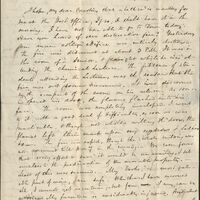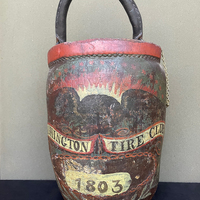
Maine Hall Burns

FMI about the Maine
Hall fire, or scan QR code
Around 3:30 p.m. on March 4, 1822, while most students were attending a lecture in Massachusetts Hall, Maine Hall caught fire and burned to the ground. The event was a seminal moment for the Class of 1825 and others affected by it. Students, faculty, townspeople, and other witnesses all wrote detailed accounts of the day’s event and its aftermath.
Many feared the College, then on shaky financial grounds, would not survive. Astonishingly, its operations were hardly interrupted despite the loss of half of its infrastructure. Within two days, the College had issued a public notice in the Portland Gazette stating that “the exercises of the College will proceed as usual,” and thanking the residents of Brunswick for offering temporary housing to the displaced students.
Benjamin Hale, Letter to Mary Caroline King, March 5, 1822. From the Hale-King Family Papers (M081).
According to eyewitness accounts, Benjamin Hale, a tutor of natural philosophy and metaphysics at Bowdoin (1820-1822), was the only person who was able to reach the room where the fire had begun. Hale’s hair and eyebrows were considerably scorched in these efforts. He described his ordeal the following day in a letter to his sweetheart:
I went to it, with a good deal of difficulty… the flames left their mark upon my eyebrows and lashes…The fire was rapid, though the whole building was not consumed till 6 or 7 in the evening. We soon found that every effort to save it would be unavailing & set ourselves to the preservation of the moveable property.
Fire Buckets from the town of Brunswick’s Washington Fire Company, after 1803. From the Abbott Memorial Collection (M001).
The Washington Fire Company was Brunswick’s earliest known fire company. It was an all-volunteer organization and each of its members was required to maintain two fire buckets. These buckets or ones like them would have been used to battle the flames at Maine Hall.


